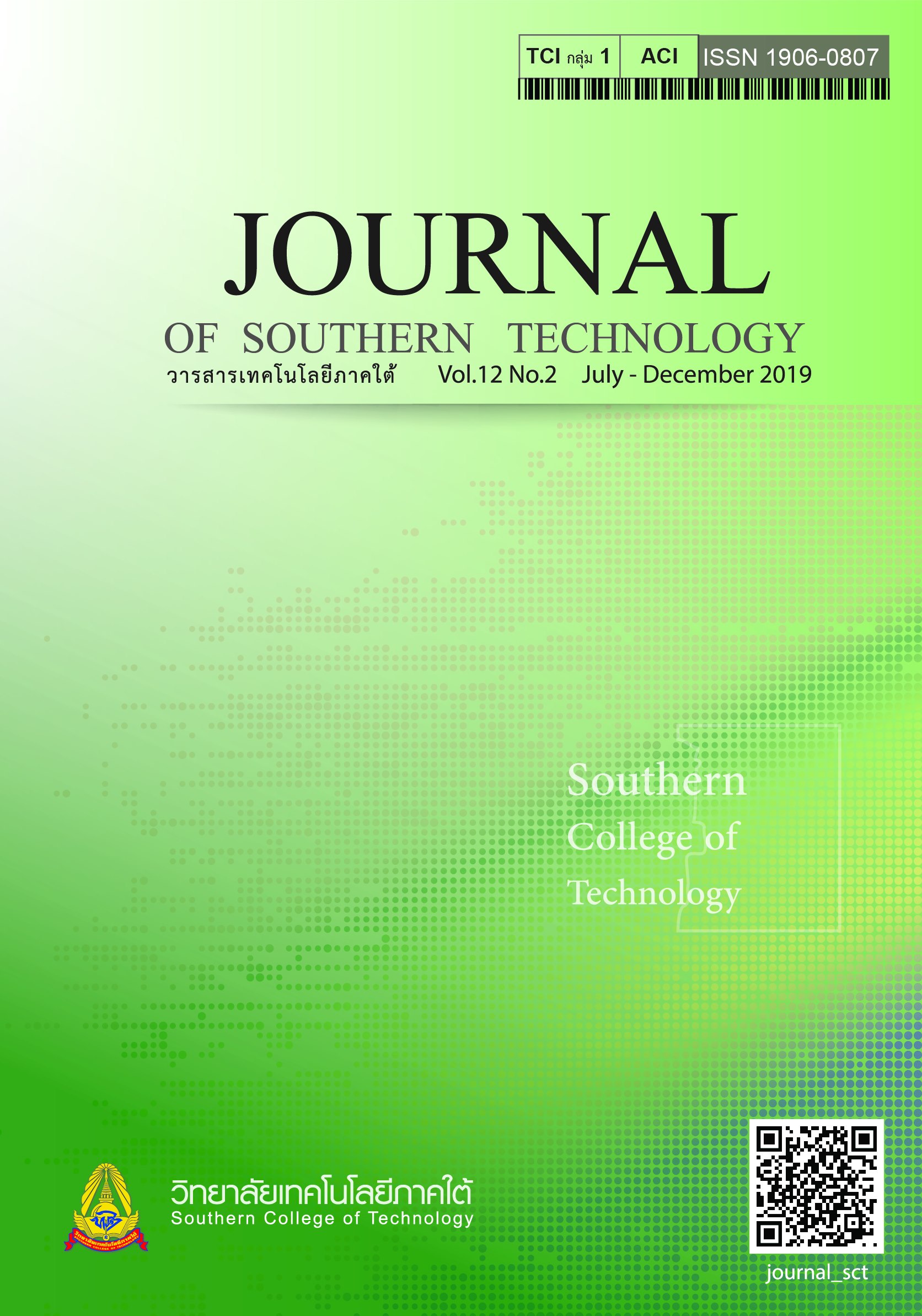The Personality and Competency of Health Promoting Personnel in Nakhon Si Thammarat
Main Article Content
Abstract
This research aimed to explore the personality and competency including core competency, generic competency and functional competency of health promoting personnel in Nakhon Si Thammarat. Samples of this study were 1) 100 health promoting personnel in Nakhon Si Thammarat, which were convenient sampling, and 2) 400 tourists/ customers, which were accidental sampling. Data were collected This research aimed to explore the personality and competency including core competency, generic competency and functional competency of health promoting personnel in Nakhon Si Thammarat. Samples of this study were 1) 100 health promoting personnel in Nakhon Si Thammarat, which were convenient sampling, and 2) 400 tourists/ customers, which were accidental sampling. Data were collected by questionnaires. The results of this study showed that the personnel’s personality is significantly important to work performance at the highest level (=4.59), which comprises 3 Ws namely; Wellness, Well-spoken, and Well-groomed. The core competency is significantly important to work performance at the highest level (
=4.63), which comprises 6 competencies namely; 1) honesty and faithfulness, 2) service minded, 3) enthusiasm to serve/ pay close attention to customer, 4) proud to be in this professions, 5) responsible for service delivered to customer, and 6) do not violate the privacy of customers. The generic competency is significantly important to work performance at a high level (
=4.42), which comprises 5 competencies namely; 1) communicate in Thai and in English fluently, 2) ability to effectively solve problem, 3) manage and resolve conflict situation, 4) creating ambiance, and 5) cultural awareness. The manager’s functional competency is significantly important to work performance at a high level (
=4.31), which comprises 4 competencies namely; 1) leading for results, 2) financial awareness, 3) strategic thinking, and 4) planning and organizing. The therapist’s functional competency is significantly important to work performance at a high level (
=4.39), comprises 4 competencies namely; 1) skillful, 2) safety awareness, 3) ability to process reservation in order to book/ amend/ cancel service correctly, and 5) promote products and services to customers. Even though the overall experience were at a high level but the level of customers’ expectation were higher than the level of experience in every dimension. The result of this study indicated that it is needed to be urgently develop the personnel ability in areas of a) manage and resolve conflict situation, b) cultural awareness, c) effectively solve problem, and d) process reservation in order to book/ amend/ cancel service correctly to raise the personnel standards to a whole new level.
Article Details
-
Authors must agree to the journal publication rules and allow the editors to edit the manuscripts for publication.
-
Author’s right belongs to the author but Journal of Southern Technology holds the right of first publication and thus allow readers to use the article for the purpose of education but not commercial.
References
Boyatzis, R. (1982). Competent Manager: a Model for Effective Performance. New York: John Wiley & Sons.
Brophy, M., & Kiely, T. (2002). Competencies: A new sector. Journal of European Industrial Training, 26(2-4), 165-176.
Buchner, D., Snelling, A., & Cohen, M. (2008). Understanding the Global Spa Industry: Spa Management. (G. Bodeker & M. Cohen, Eds.). Amsterdam: Elsevier/Butterworth-Heinemann. pp 394-413.
Chanin, O., Phooma, J., Chan-in, P., Suttara, R., Sananut P., & Sriprasert, P. (2011). Guidelines for developing management system for sustainable tourism industry in Nakhon Si Thammarat (Research Report). Bangkok: The Thailand Research Fund (TRF). [in Thai]
Costa, P., McCrae, R., & Kay, G. (1995). Persons, Places & Personality: Career assessment using the revised NEO personality inventory. Journal of Career Assessment, 3(2), 123-139.
Esichaikul, R. & Chansawang, R. (2016). A study of potential of spa business in Thailand. Modern Management Journal, 14(1), 17-31. [in Thai]
Issariyapat, J., Polsarum, P., Techasermsukkul, L., & Chompoothip, S. (2013). Promoting Factors of Thai Wellness Tourism to be Tourism Industrial Hub (Research Paper). Bangkok: Office of Small and Medium Enterprises Promotion (OSMEP). [in Thai]
Jantaro, O., Longprasert, S., & Changkid, N. (2016). Spa guests’ behavior towards spa service selection in Surat Thani Province. Suratthani Rajabhat Journal, 3(1), 185-205. [in Thai]
Kongkasawat,T. (2005). How to Apply Competency in Organization. Bangkok: Technology Promotion Association (Thailand-Japan). [in Thai]
Laoharawe, W., & Esichaikul, R. (2010). Job Competencies for Day Spa Personnel in Bangkok Metropolis. In The 4th Rambhai Barni Academic Research Conference (pp. 345-350). Bangkok: Rambhai Barni Rajaphat University. [in Thai]
Luthan, F. (2008). Organizational Behavior. (11th ed.). New York: McGraw-HillIrwin.
Mathis, R.L., & Jackson, J.H. (2006). Human Resource Management. (11th ed.). Ohio: South-Western.
McClelland, D.C. (1973). Testing for competence rather than intelligence. American Psychologist, 28, 1-14.
Merakate, J. (2016). Desired characteristics of spa therapists by the spa executives’ and foreign customers’ opinion in Chonburi Province. RUMUTTO- Social Science Journal, 5(2), 70-79. [in Thai]
Nangklapiwat, Y. (2014). Preparation of Thai Labour in tourism industry for the ASEAN economic community integration. APHEIT Journals, 20(2), 158-169. [in Thai]
Office of the Civil Service Commission (OCSC). (2009). Standard and Guideline to set up Necessary Knowledge, Abilities, Skill and Competencies by W 27/2552. Bangkok: Office of the Civil Service Commission. [in Thai]
Parasuraman, A., Zeithaml, V.A., & Berry, L.L. (1985). A conceptual model of service quality and its implication. Journal of Marketing, 49, 41-50.
Phowittayapan, A. (2005). Competency Dictionary. Bangkok: HR Center. [in Thai]
Saenthong, N. (2007). Get to Know Competency. Bangkok: HR Center. [in Thai]
Silpcharu, T. (2006). Research and Data Analysis by SPSS. (5th ed.). Bangkok: V Inter Print. [in Thai]
Wongnitchakul, W., & Khongthanasinthon, K. (2010). Service marketing mixed strategies influencing the Japanese customers in selecting day spa in Soi Thonglor, Sukumvit Area, Bangkok. BU Academic Review, 9(2), 10-22. [in Thai]
Yamane, T. (1973). Statistics: an Introductory Analysis. (3rd ed.). New York: Harper and Row.

